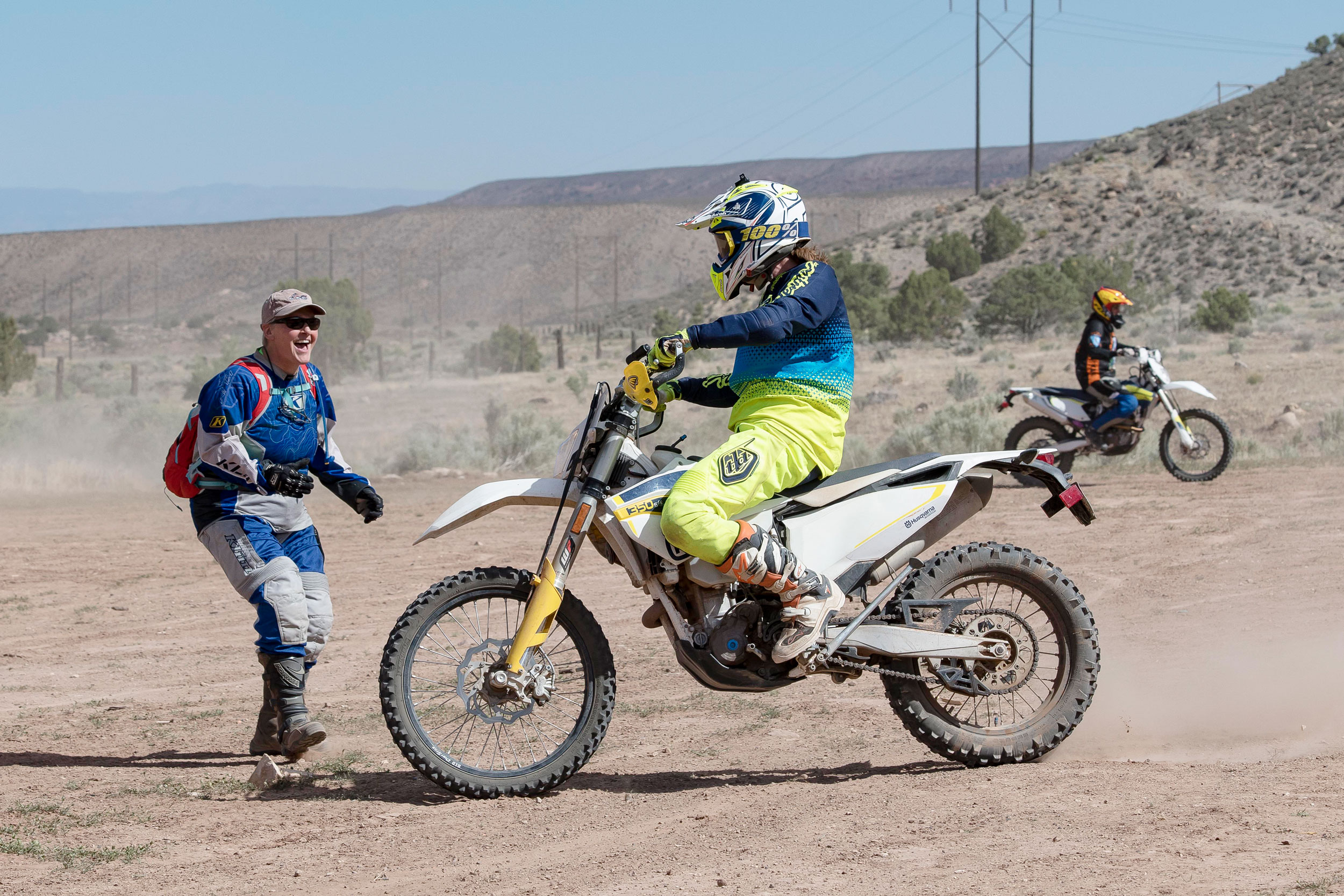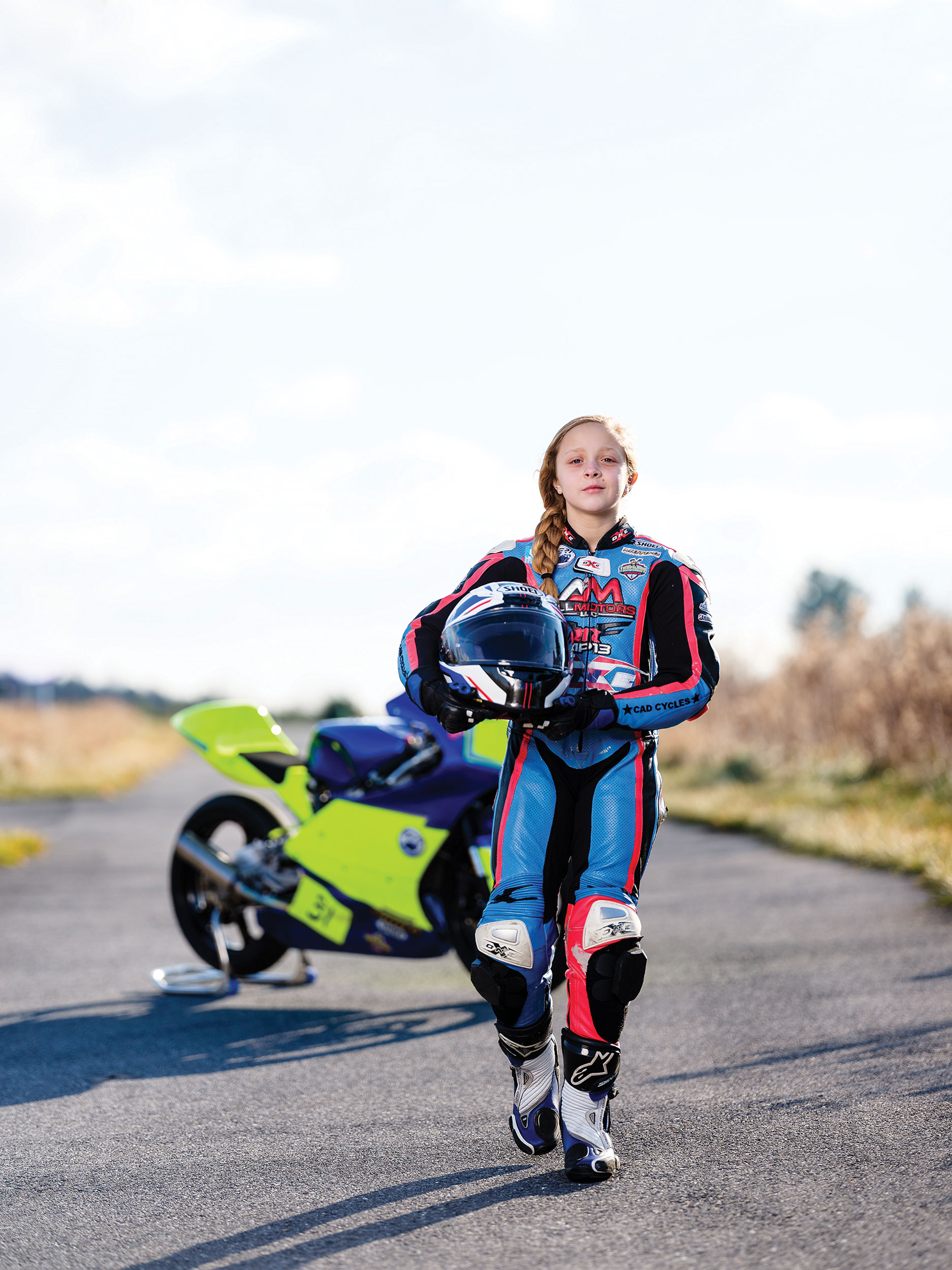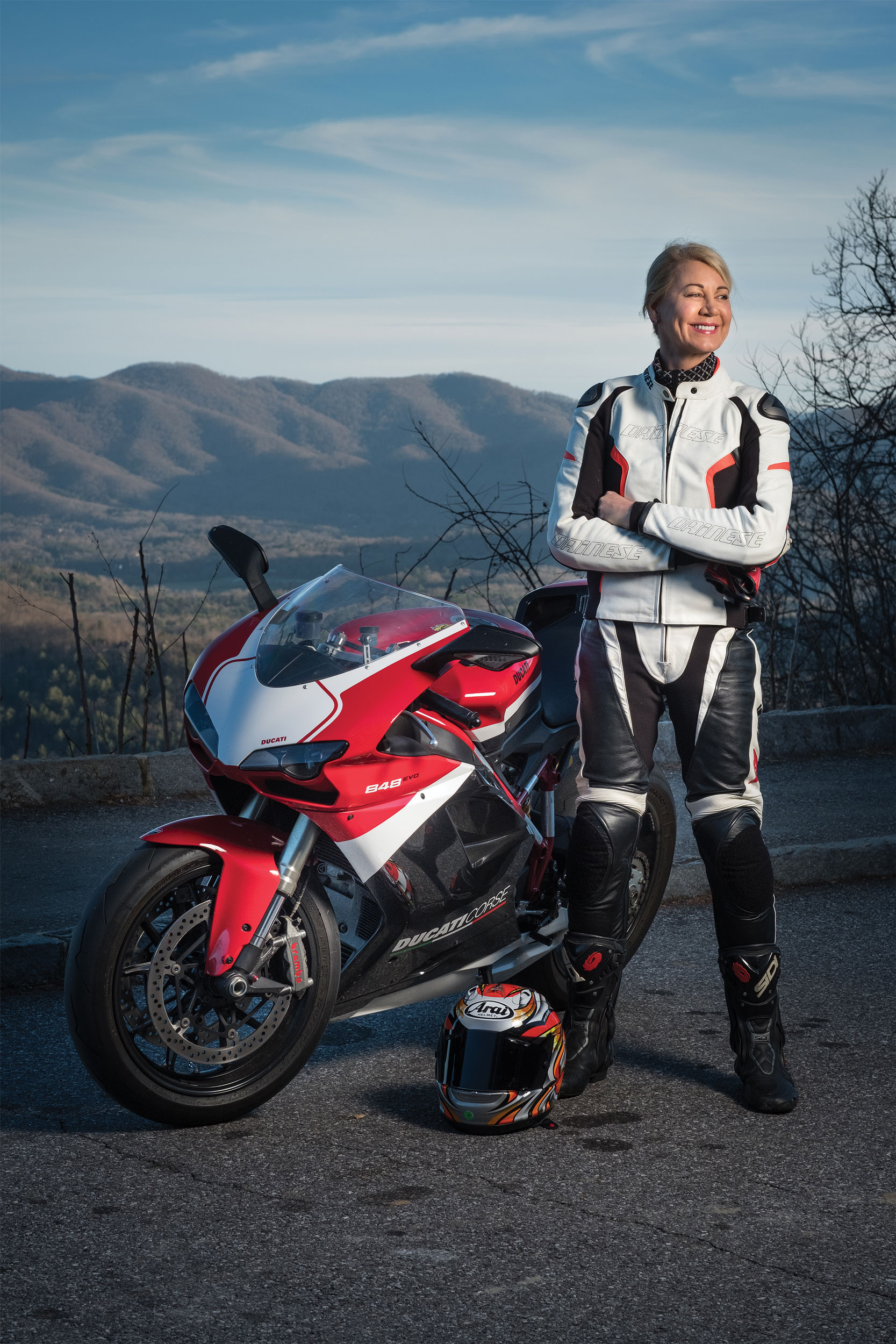American Motorcyclist February 2018
Three Paths, One Lifestyle
Women Thrive In Motorcycling Community
By Ashley M. Price
The history of motorcycling is sprinkled with the stories of strong, determined women who bucked the odds to carve out a place for themselves.
The AMA Motorcycle Hall of Fame preserves the stories of such pioneers, including Pearl Hoel, Hazel Kolb, Dot Robinson, Bessie Stringfield, Adeline and Augusta Van Buren and Margaret Wilson.
All were female motorcycling ambassadors for many decades. All of them broke down barriers.
Other inductees into the Hall of Fame, such as Becky Brown, Sharon Clayton, Mona Ehnes, Debbie Evans, Sue Fish, Linda Giovannoni, Rita Gregory, Phyllis McClure and Cris Sommer-Simmons are dedicated to making motorcycling a mainstream activity for more and more women.
Today, many women are a part of the motorcycle lifestyle and can be found at all levels of motorcycling, from a backwoods trail to an interstate highway, from the local motocross track to the executive board room.
Here are three of their stories.

Photo by Cathy Larson, Grizgirl Photography
Vehicle Of Empowerment
Patricia Jacques views her motorcycle as a vehicle of empowerment. Riding helped her gain confidence in herself, and encouraged her to teach other women to believe in themselves, as well.
Jacques was first exposed to motorcycles while watching a round of the FIM MXGP series in Germany, where she was living on an Army base with her family. Just 4 years old, she instantly fell in love with the speed and intensity of motorcycle racing, watching the professional racers effortlessly maneuver the track.
Seven years later, motorcycles were still on Jacques’ mind when her dad asked her what she wanted as a reward for making the honor society at school.
After begging for a motorcycle for weeks, Jacques finally got a Honda minibike to ride around the backyard. The only stipulation was that she had to share the bike with her brother.
“I rode that thing until it pretty much wouldn’t go anymore,” Jacques said. “From the minute I got home from school until it was dark outside and my parents were begging me to come inside, I was riding. I rode that little thing all around the neighborhood and showed off to all the other kids. Even at a very young age, I loved going fast and being the best.”
Jacques’ younger brother began competing in local motocross events, but, while she was always at the track with her family to watch, she wasn’t allowed to compete herself.
After more months of begging, she finally convinced her dad to let her ride practice.
“I know he didn’t take me seriously before that,” Jacques said. “I know it was practice, but I pretty much went out and lapped the whole field. And, since I had to be a registered racer to ride practice, I talked my dad into letting me actually race that same day. Let’s just say he knew it wasn’t a joke after that.”
From that race forward, motocross racing consumed her life. She said her competitive edge pushed her to want to win races and be the best. Her results showed that. She was beating the boys and finishing up front at events, such as the AMA Winter Nationals in Florida.
“I could hear people say, ‘Oh! That’s a girl!’ when I’d come around the track,” Jacques said. “I was just about the only girl racing motocross on the East Coast that was getting the results I was, so most of these guys had never seen a girl ride, let alone beat them.”
Although Jacques was turning out impressive results, she found herself battling mental road blocks and lacking confidence. She realized the pressure she was putting on herself to win was both mentally and physically unhealthy.
“I felt like I had to beat the boys to prove myself,” Jacques said.
Jacques said she now realizes the pressure she put on herself to win took away the comfort she found in riding.
“I changed my perception,” she said. “Instead of trying to be the best at something, I began simply doing the best I could on any given day. I didn’t have to win anymore to feel good about myself.”
After that revelation, Jacques decided to help empower other women through motorcycling.
She now owns and operates ADV Woman, a riding school devoted to instilling confidence in women by teaching them to ride off-road.
Jacques also organizes an annual adventure ride for women through Back Country Discovery Routes and encourages riders of all skill levels to take part in the ride.
In her spare time, Jacques advocates on behalf of female riders. She said raising awareness is the key to expanding the industry and convincing more woman to ride.
“Women are at a pivotal point in history,” Jacques said. “What’s important to remember—and what a lot of women can learn from riding a motorcycle—is that we, as women, are worth far more than what we think of ourselves. We do not need to ask for permission. We do not need to apologize. And we need to do more of what makes us happy, which for a lot of us is riding or racing motorcycles!”

Photo by Hartman Benzon
The Next Generation
At just 10 years old, Kayla Yaakov is already showing everyone that a girl should never be doubted.
Yaakov started riding at 3 when her dad, David Yaakov, bought her a dirt bike to ride at their house. She had seen pictures of bikes, and although she barely knew how to walk or talk, she had made it very apparent from an early age that she wanted to race motorcycles.
Her father, a former racer himself, didn’t take his daughter very seriously when she first told him that she wanted to race. She was so young. But the minute he saw the talent she had, he didn’t hesitate.
“At first, yeah, she was good,” he said. “But by the end of that first season, she was winning. That’s a pretty fast advancement for any racer, especially someone her age.”
Seven years later, Yaakov is beating competitors who are three or four times her age. She said the adrenaline and speed are her favorite parts of competition.
“I got my first championship when I was 5, and it felt really good,” Yaakov said. “I love winning and beating other people. It doesn’t matter if it’s boys or girls—that’s my motivation.”
In 2017, Yaakov was recognized as the 2016 AMA Youth Road Racer of the Year for her impressive efforts on the track, winning multiple classes.
She currently races Honda 250 GP style bikes. These are full-size bikes, so Yaakov sometimes struggles with her weight and height while riding. But he said she doesn’t let that stop her.
One of her most prominent abilities is being able to adapt, overcome obstacles and win.
“Our pit always has people in it coming over to talk to Kayla and about her racing,” David said. “They can never believe her size and how fast she is. Sometimes, I forget how fast and talented she really is. It’s a nice reminder when I see the lap times and know she’s out there doing what she loves.”
Both Yaakov and her father are confident her future will involve motorcycles. She hopes she can inspire other girls her age to start racing or riding motorcycles, “because there is nothing to be scared of.”
“I want to be World Superbike champion or MotoGP champion,” Yaakov said. “I think all girls and everyone should race motorcycles. If they try it then they will love it.”

Photo by Matthew Franklin Carter
A Minority Within A Minority
When she was younger, Dr. Laura Ellis never would have guessed that she would be riding a motorcycle or owning her own road racing team.
“I was a science nerd,” Ellis said. “I love biology and chemistry, and that’s eventually what led me down the path to working in the private sector of the [U.S. Centers for Disease Control and Prevention] and then, eventually, to medical school to be a surgeon.”
Aside from her academic and professional background, Ellis had an interest in high-adrenaline and extreme sports and enjoyed rock climbing and mountain biking.
When she was in her early 30s, Ellis got involved with motorcycles after some of her friends who raced cars sparked her interest in motorsports. She eventually decided to hop on a motorcycle herself and began riding recreationally on the street before participating in some road racing schools and local club races.
The competition interested her, because she’s always had a drive to win and be good at whatever she is doing. She said that same interest is what made her want to be a doctor.
“Women are a minority in both medicine and motorcycles,” Ellis said. “As a woman, I do not want to be seen as helpless. I want to be respected and show others why they should respect me. This meant knowing my worth and then showing my work ethic and ability to others.”
After graduating from medical school, Ellis found herself operating on professional athletes. Her interests in sports and medicine began to merge.
As a result, she decided to officially combine her passions for motorcycles and racing with science and medicine by working as a sports physician for a racing team in the MotoAmerica series.
“I had been introduced to the series and was incredibly impressed with the talent of the racers,” Ellis said. “I became very intrigued and began thinking of ways I could use my knowledge and experience to help these athletes reach peak physical performance and help them become even faster.”
Ellis began running tests and focusing on aspects of health and fitness that few trainers or physicians in the racing series had considered.
She conducted brainwave testing, monitored energy levels and mental and emotional readiness. She did extensive research on concussions and the effects concussions can have on a racer’s mental ability.
“It was intimidating at first, because it fueled a lot of adversity,” Ellis said. “But I came in wanting to learn and help—not with my hands on my hips like I knew everything. Eventually, I became accustomed to [the industry] and showed people that we should direct our attention to the mental wellbeing of these athletes, if we want them to advance.”
Today, Ellis remains one of the few female MotoAmerica team owners, while still keeping her primary focus on the racers and their fitness.
Ellis hopes to raise knowledge within the sport and sports medicine practices. She believes road racing can be raised to the same level as other professional sports by emphasizing the riders and their mental abilities at the top of their game.
“I don’t really think making a difference has anything to do with gender,” Ellis said. “It is more important to prove to others your worth through your work ethic.”
